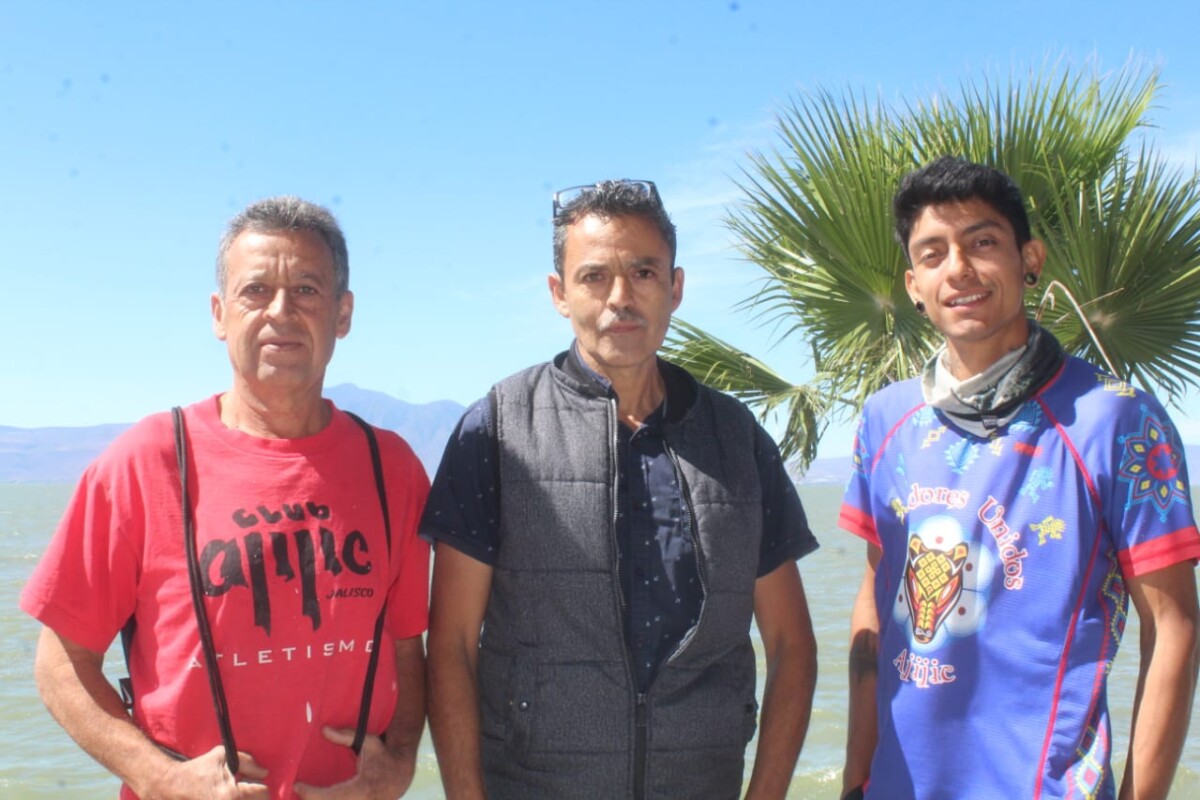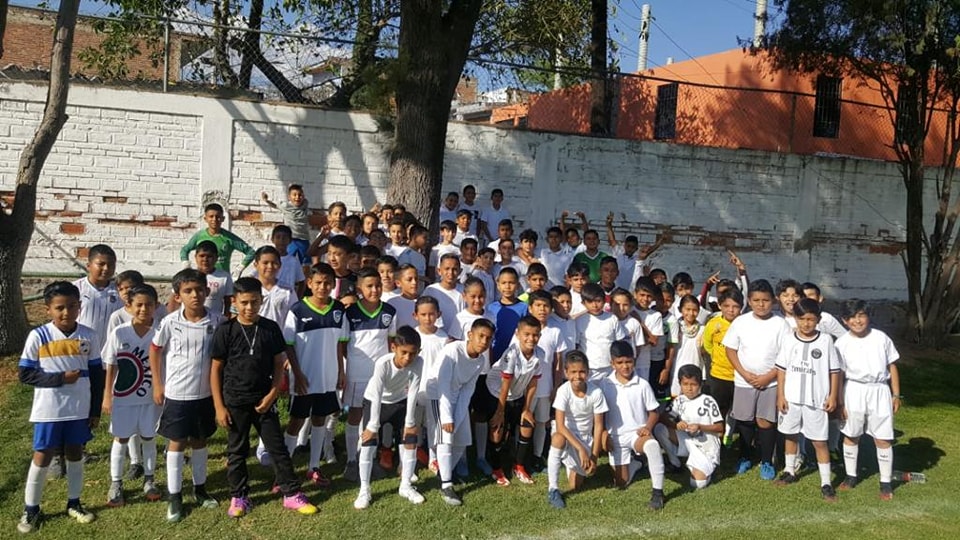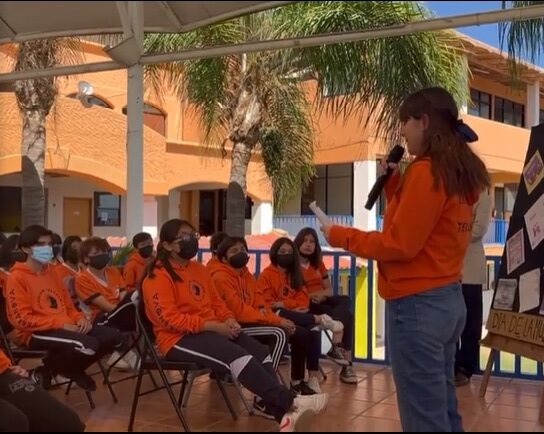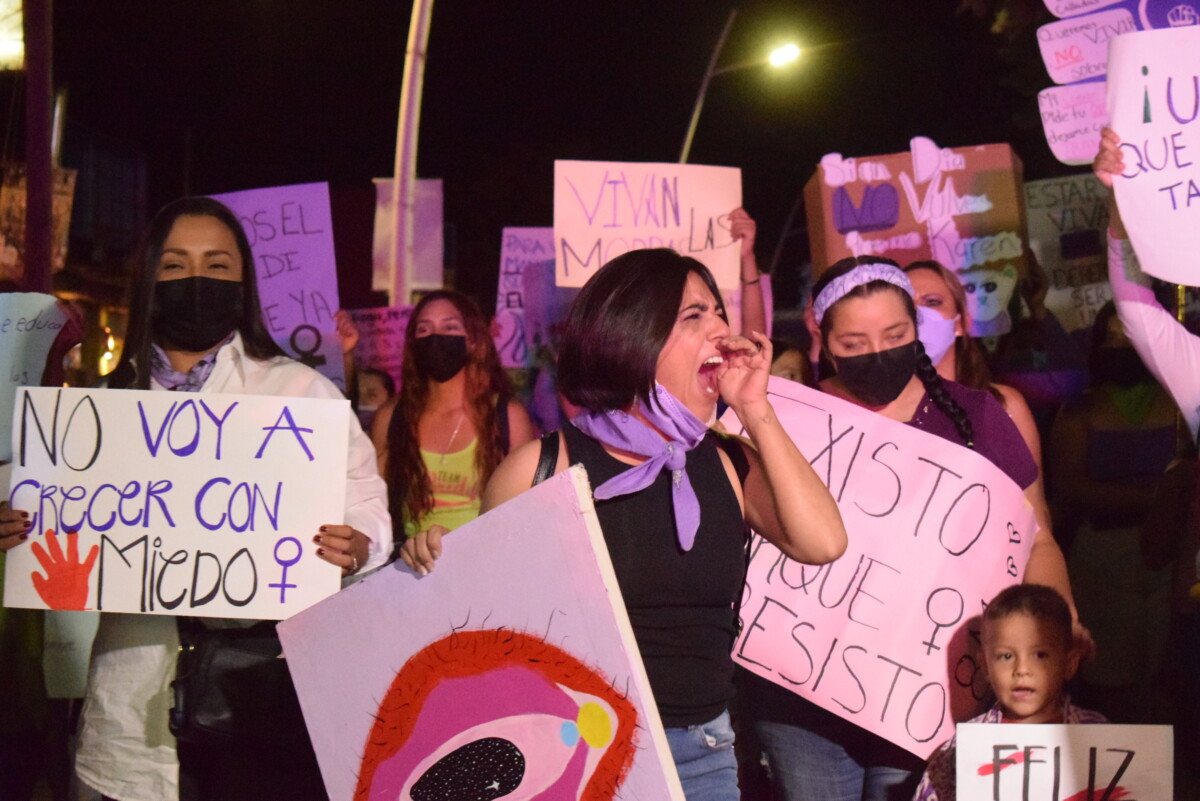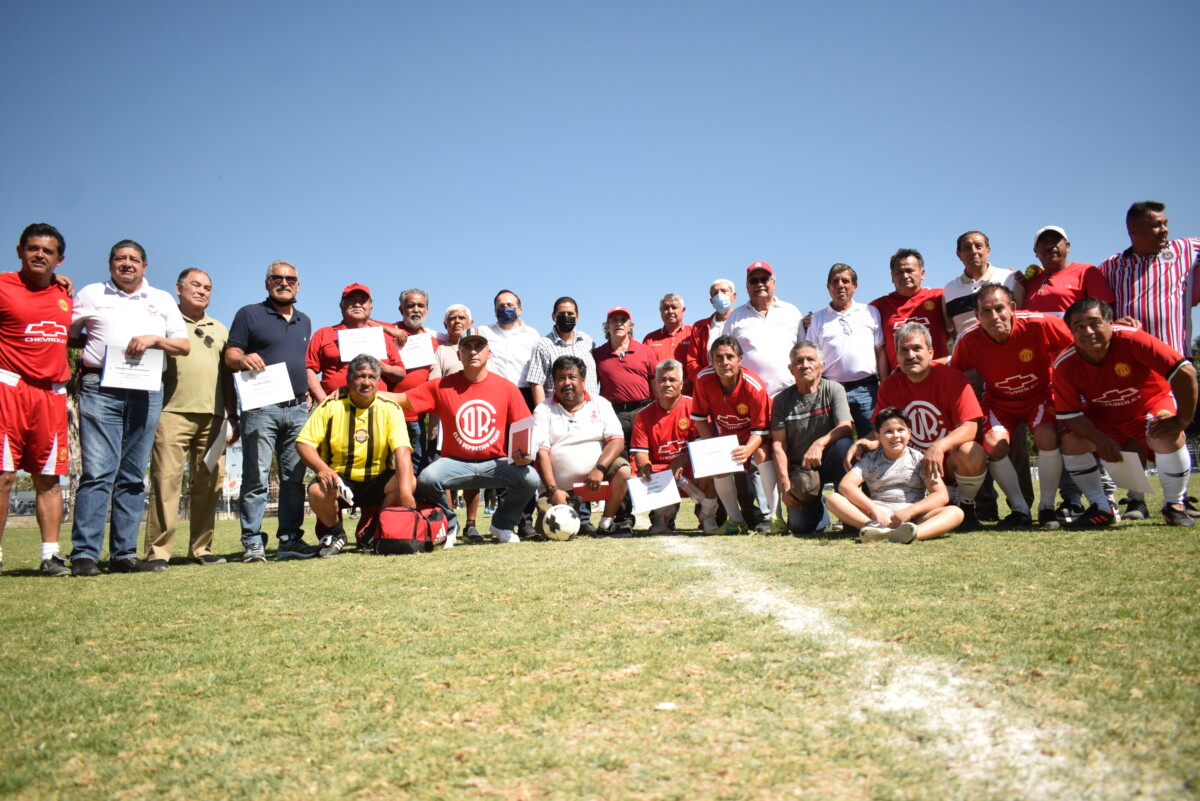en inglés
Popular multi-talented singer will perform two shows this weekend in Ajijic
Crisia Regalado sings opera rock
Patrick O’Heffernan(Ajijic).- The wildly popular Mexican-American singer Crisia Regalado will perform two concerts in Ajijic this weekend. Trained in opera, jazz, mariachi, and synthesizer, she blends them together in operatic jazz, synth pop and rock, and traditional Mexican music.
Regalado is on tour in México and agreed to take a detour from Guadalajara to Ajijic. She will perform Friday night at Dharma’s Bistro on the Ajijic Malecón in her operatic synth-pop electronic persona, Sin Color, and Saturday night at Casa Domenech in LCS as CRISIA! Delivering operatic jazz, rock and traditional Mexican songs.

Crisia as Sin Color ready for takeoff
In a telephone interview with Laguna, Crisia said “I am so excited and grateful for the opportunity to perform for the Magic Pueblo, Ajijic. Thank you México for receiving me with open arms!” adding that she is looking forward to touring the sights of Lakeside.
Regalado has 1 million streams on Spotify and over 13,000 followers, half in México. Performing since she was child, she has performed in operas, jazz and rock clubs, with mariachis and her electronic pop band. She has released two albums. This tour marks her first live shows in México.
Homeowners sue Chapala, SOS Chapala Dog Rescue, and Jalisco Pension Fund over dog refuge in West Ajijic
Dogs in the West Ajijic shelter. Photo: Archive
Editor. A group of 20 Mexican and Expat homeowners and representatives of several Homeowners Associations in West Ajijic have filed a lawsuit against the SOS Chapala Dog Rescue organization, the Chapala government, and the Jalisco State Employees Pension Fund over the dog shelter established by the previous municipal administration near homes. The shelter is operated by SOS under an agreement and occupies land transferred from the municipal government to the state Pension fund by the Móises Anaya Administration.
In a copy of the lawsuit obtained by Laguna, the plaintiffs charge that the dog shelter was illegally established by the Anaya Administration on land zoned for housing only, and that the agreement between the Anaya Administration SOS Chapala Dog Rescue was invalid. The suite requests that the court order administrative action be taken to move the shelter to a site zoned for the correct use.
Because the site of the shelter belongs to the Jalisco State Pension Fund, which is “the one that legally has the power of deed on that land”, the Chapala Department of Ecology is acting as a mediator of all parties involved and seeks to ensure that everyone has a favorable response to this situation.
The Chapala government issued a statement saying that “ the Municipal Government has been in constant communication and dialogue to generate agreements, one of them is that the people in charge of the association (SOS) have agreed to change the location of the shelter.
SOS representatives contacted by Laguna said there was no formal agreement, but they have agreed to move if a suitable site is located and meets the necessary criteria. They told Laguna in a message that while negotiations are ongoing , to date “ the Department of Ecology has suggested a new site and SOS has suggested a new site, but no one knows if either of these places is willing to provide a lease and no one knows what the rent would be.”
The shelter has been contentious since it was established by the former Director of Ecology, José Jaime Ibáñez on land originally donated to Chapala for a cemetery but was unusable for that purpose. Several years later, Jaime Ibáñez decided to use it for a shelter for stray dogs and other animals in the area in response to legislation passed by the Chapala Council. But, since the land had been given to the state Pension Fund in repayments for debts, leases or permits issued by Jaime Ibáñez’s staff were not valid.
Additionally, no discussion was held with nearby homeowners by Jaime Ibáñez or his staff and he told Laguna on October 20, 2020, that “We did not meet with the homeowners in advance because we saw that the developments were not close to the site and we did not anticipate any problems (and) we were surprised by the opposition”.
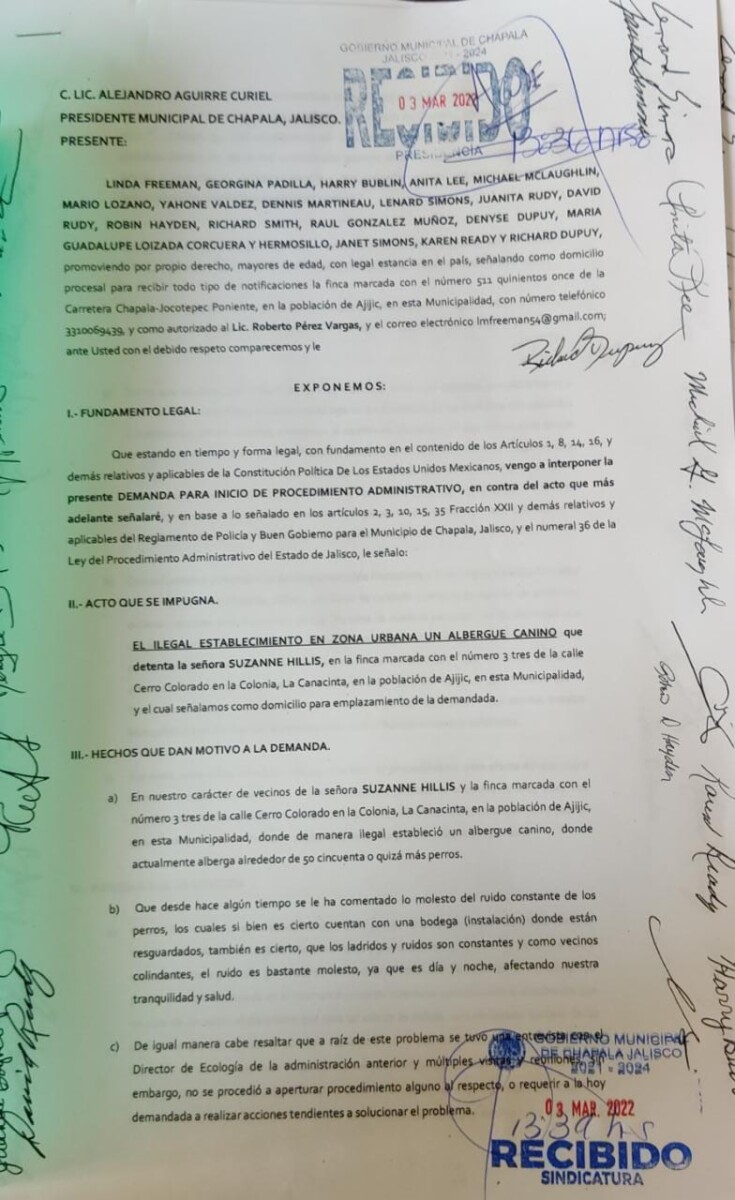
Lawsuit filed by homeowners
The homeowners immediately registered their opposition to the shelter built without their knowledge and the 24-hour a day barking of the sheltered dogs which upset their lives and lowered property values . The shelter affected the residents of nearby developments of Puerta Arroyo, Sierra Viva, Los Sabinos, Villas Colorado, and Los Alebrijes and La Canacinta.
The residents of those developments – about 200 households, half of which are estimated to be Mexican by the HOA officials — submitted a petition to 7 government agencies in 2021 to solve the noise problem and subsequently met with Jaime on July 28, 2021, to find a new location. Several sites were located but were rejected for various reasons by Jaime Ibáñez, despite his promises to resolve the problem.
Just before the end of the Anaya Administration, Jaime Ibáñez staff forged an agreement with SOS Dog Rescue to manage the shelter, although the Administration knew it was not on land controlled by the municipalidad, handing the problem to the state and SOS to deal with the impacted homeowners.
SOS Chapala Dog Rescue expanded the shelter and improved conditions for the dogs so that it is now one of the best run shelters in North America, according to inspections by other shelter operators. But the expansion created more noise for the homeowners, and negotiations have continued. SOS installed mitigation measures like dog feeding schedule changes and soundproofing, but these actions did not mitigate the noise of the dogs, and measurements by homeowner representatives found the barking exceeded 80 decibels – the legal maximum in Chapala.
SOS has resisted moving the shelter unless the move is paid for, the new site meets its conditions, and an orderly transition can take place to care for the dogs. The homeowners agree that the welfare of the dogs is paramount, but question why they should pay for a problem created by the municipality and now owned by the State. However they are willing to raise funds to rent a suitable site for three years — a continuation of an offer they made in 2021 to the Anya Administration to no avail. Faced with inaction and what they see as a record of broken promises the owners have filed suit.
Runners from Ajijic to compete in international race
From left to right: Ricardo González, Alejandro González, director of COMUDE and Aurelio Márquez. Photo: Sofía Medeles
Sofía Medeles (Ajijic).- Two of Ajijic’s own, Aurelio Márquez Rodríguez «Nano» and Ricardo González González «Chicles,» will compete in the international race Ultra Machu Picchu, in Peru, on April 10, 2022.
For Ricardo, 63 years old and with 25 years of running experience, this race is one of many he has run abroad. For Aurelio however, who is 27 years old and has been running for three years, this is the first one he will participate in outside of Mexico. Both will run 30 kilometers; Aurelio «Nano» in the free category and Ricardo «Chicles» in the 60 to 64 years old category.
To support Aurelio with travel expenses, the Corredores Unidos (Runners United) group organized a race last Sunday, March 6, which attracted more than 90 people in the streets of Ajijic. There was also a fair to help raise funds.
For his part, Ricardo González said that he makes a point of putting money aside, so that every two years he can participate in an international race, the last one being in Argentina in 2019.
«On many occasions I have invited different runners to accompany me to international races but Nano (Aurelio) is the first one who showed interest. I invited him because he is one of the best that the town currently has and I like the runners to meet, go out together, meet other good people and make friends,» said Ricardo.
This being his first race abroad, Aurelio admitted he is nervous, but said he will do his best to give a good performance. He also believes that part of growing as a runner is meeting and competing with people better than he is, who motivate him to improve.

Ninety athletes participated in the race held on March 6 to raise funds for the trip. Photo: Alejandro González
Alejandro Gonzalez Gonzalez, the head of the Municipal Sports Council (COMUDE) Ajijic, said he was willing to support local athletes who show promise, regardless of the sport they practice.
In particular, he noted that the construction of the track at the Unidad Deportiva, located in La Floresta, is continuing so that runners will soon have a safe space to practice.
Ricardo requested that family members of athletes make an effort to support and motivate them in their careers. To the public in general, he reminded them that practicing sports develops good habits in people, such as discipline, saving, healthy eating, etc.
Aurelio invited young people to take up running, and to surround themselves with people who have the same interests in order to feel supported and motivated.
For those who wish to support the runners, donations can be made at the Ajijic delegation.
Translated by Rebecca Zittle
Six Chapala soccer players selected to play for the Chivas club
Children who came to the call for the tryouts, at the Juan Rayo municipal field.
Jazmín Stengel.- Six children were selected by the Chivas de Guadalajara club out of 188 who tried out, after tryouts held on Monday, March 7, at the Juan Rayo Municipal Field in Chapala.
In the first category, 16-year-old Gerson García Ortega qualified in the field, while Eduardo Raygoza Pérez and Juan Diego Ascencio Vilchis of the same age, managed to stay in the red and white goal.
In the youngest category, three campers were selected, Fernando Guadalupe Martínez Casillas and Santiago Gutiérrez González, 12 years old, and Armando Karin Serna Pajarito, only 11 years old, being the youngest.
But the most important thing to qualify for this type of team is to be creative and bring novelty to the game, said Juan Miguel Siordia Vázquez, Chapala’s scouting coordinator.
Translated by Kerry Watson
Terranova Institute commemorates International Women’s Day
Terranova Institute students commemorated International Women’s Day by sharing examples and opinions regarding the violence they suffer throughout the country. Screen copy.
D.Arturo Ortega (Chapala).- Students stood on the terrace of the Terra Nova Institute demanding the respect that is due them from a society that has owed them since the beginning of time.
Student, Julieta Ortega spoke of the cases of Renata from Oaxaca, Karina from Chiapas and a 14-year-old girl from Jalisco who were all victims of femicide.
«What fear, what rage, what terror! I am sick of living in a place from which I leave my home, but to return is a privilege. I leave with little hope of returning — not only me, but my friends, my teachers, my mother and my sister,» said the outraged high school student.
The young woman shared the results of a 2021 report where the national authorities reviewed 275 cases of femicide and macho violence examining the reason for the irrational hatred of one gender towards the other. Forty-eight percent of the aggressors committed violence because the victim did not want to have sex, and the other 52 percent because the woman disobeyed. This type of violence against women afflicts all 32 states of Mexico.
Julieta reflected: «they are killing us for being women, and every day we suffer intimidation, harassment, threats, resignation, silence and fear.» She said these are reasons not to “celebrate” International Women’s Day but to march to be respected, valued, heard, and to fight against hatred, violence, lack of equity and justice towards the female gender.
«If they kill me and if they find me, this body marked by violence will be the hands that remove the blindfold from people’s eyes. And if they kill me and if they find me, may my death give strength to raise my voice, to remove the ropes from the mouths of my sisters who are still there,» were the poetic words with which Julieta concluded her message.
Terranova Institute celebrated International Women’s Day with conferences, reflections and denunciations from its students.Also present at the meeting were special guests Anabel Lechuga and Erika de la Cerda. The photographer, María Di Paola, gave a presentation of the history of achievements and examples of courageous women whose contribution and sacrifice have allowed us to reach the moment we live in.
Translated by Nita Rudy
The price of fish from Lake Chapala increased for Lent
Tilapia, one of the most consumed local fish at Lakeside, costs up to 65 pesos each on Fridays during Lent. Photo: Jazmín Stengel.
Jazmín Stengel (Ajijic).- This year, seafood products in general increased between 10 to 15 percent during Lent (March 2 to April 14), and fish from Lake Chapala costs up to 25 pesos more per piece on Fridays.
According to merchants selling seafood products such as basa (a catfish) fillet, tilapia, and shrimp increased very little at the beginning of Lent, so most merchants kept their prices fixed, as did seafood restaurants.
In the Chapala market and downtown fish markets, the price of tilapia and basa vary between 130 and 150 pesos per kilogram. In comparison to last year, the cost averaged an increase of 20 to 30 pesos. Shrimp prices remained the same, ranging between 245 and 250 pesos per kilogram.
Lake Chapala fishermen have increased their prices considerably. Tilapia and catfish from the lake, which in 2021 ranged from 25 and 35 pesos, now range between 40 and 50 pesos.
In addition, with the beginning of the Lenten season, local sellers increased their prices by ten pesos more to take advantage of the demand for the product. As a result, a piece of tilapia or catfish can cost up to 65 pesos on Fridays, while a kilo of tilapia fillet costs around 130 pesos.
Consequently, the prices of dishes prepared with the local product did increase in street markets and small stores; and some of the inhabitants who used to eat fish on Fridays during Lent stopped doing so.
«The tradition is no longer the same, few people respect it,» commented one of the merchants. In addition to selling less fish, the merchant notices every year how customs are changing. «Now they sell meat all week long,» said a citizen who saw taco stands open even on Lenten Fridays.
On the other hand, consumers have become increasingly skeptical and no longer follow the Catholic tradition of not eating meat during Lent, as expressed by Mariana, who only stops eating meat on Fridays and now with the high prices has also stopped consuming local fish.
Consumers are advised to research the safety of fish from Lake Chapala. Fish from Lake Chapala are both farmed and caught wild as well as for sport by local fishermen. Dr. Todd Stong has studied the lake and fish for almost 2 decades and reported that fish from the lake are well below the international limit for safety. (Annual State of the Lake Report 2020, Part 1). A PMC report indicated that PCB’s and other toxins bioaccumulate in Lake Chapala fish (Bioaccumulation of PCBs and PCBs in Fish from a Tropical Lake Chapala, Mexico)
Translated by Kerry Watson
Women demonstrate against abuse in Chapala
The march for women’s rights in Chapala advanced with the cry «The oppressor state is a male rapist.» Even children participated in the march.
Jazmín Stengel (Chapala).– More than 200 women who demonstrated on Tuesday, March 8, International Women’s Day, used the facade of the Chapala City Hall as a forum to expose the children of former public officials, teachers, among other aggressors of women in the municipality.
The march began after 8:00 p.m. and proceeded along Francisco I. Madero Avenue. Protesters closed the road at the intersection with Morelos Street and Hidalgo Avenue for a little more than ten minutes, and then went to the front of the City Hall. Posters with feminist messages had been pasted on its façade starting two days earlier.
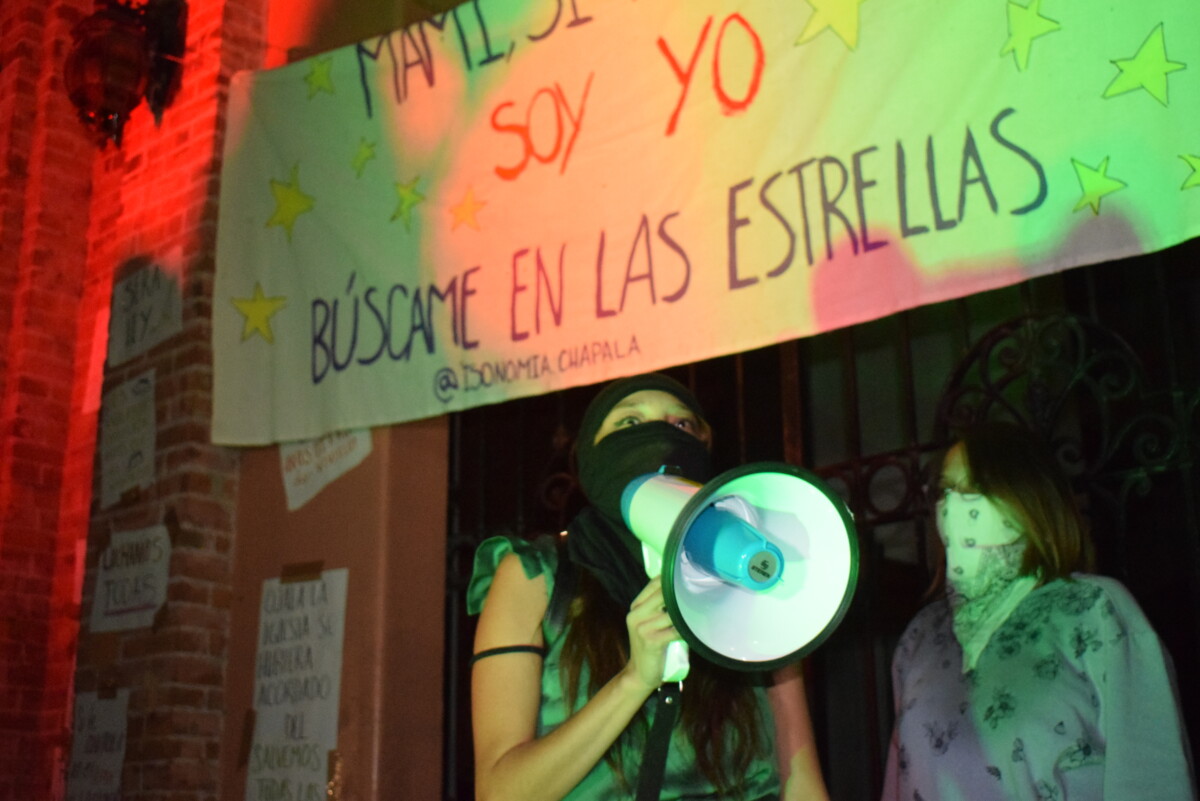
The government was publicly accused of covering up cases of abuse in the municipality: «I am here for those that my municipality wants to erase and silence. No more impunity!» said the protester.
There, different women, especially young women, spoke of cases of harassment, rape and violence committed by the children of former public officials, current public officials, teachers and private individuals, in order to publicize the names and thus avoid further harm to women.
«As long as there is no justice for the people there will be no peace for the government,» declared one of the signs of the young women protesters who on more than one occasion accused the government of protecting the aggressors. They also claimed they were ignored by the authorities when they filed complaints with the Public Prosecutor’s Office.
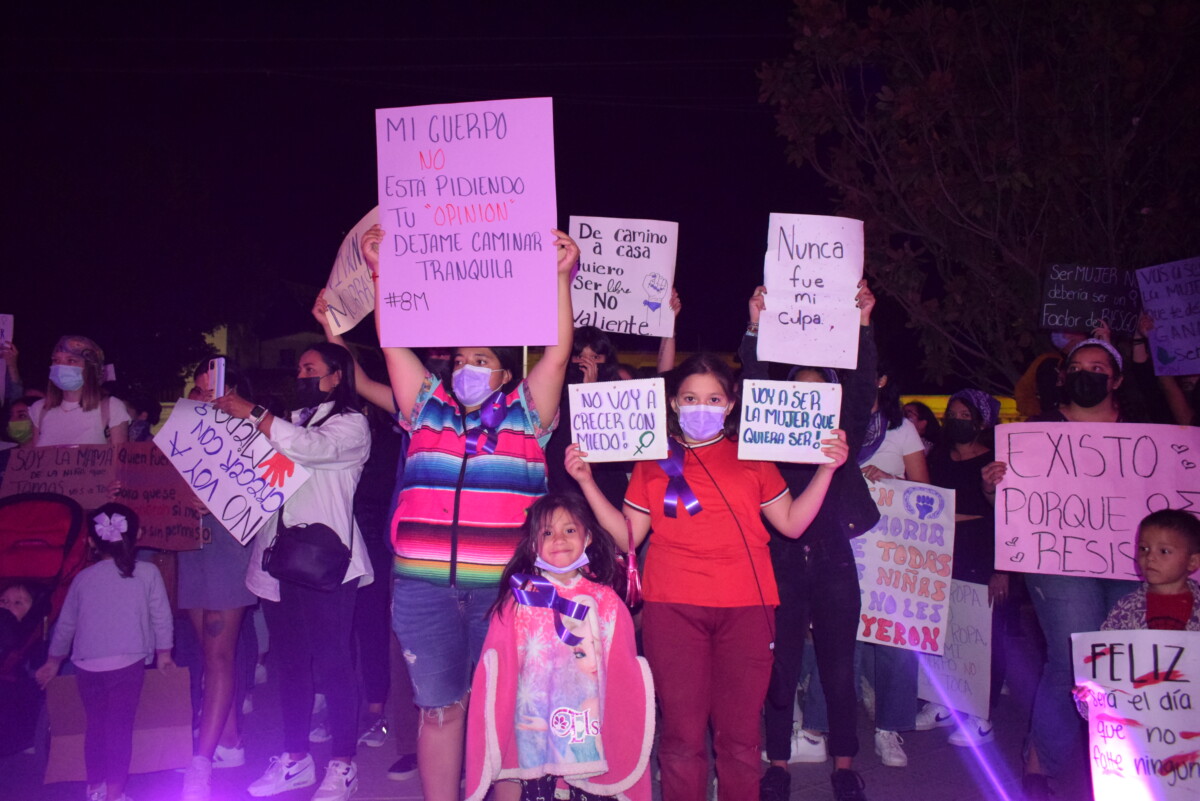
Children also expressed the desire for a better future, «I don’t want to grow up with fear» and «I will be the woman I want to be,» they said during the demonstration.
«I am here for those that my municipality wants to erase and silence. No more impunity!» and «What does a country that sows bodies reap?» read among some of the signs carried by the protesters.
«We are the cry of those who have no voice» said another poster, referring to the 13 women who have disappeared in our municipality. An altar for these women was placed in a door to the building with the message «Sorry for the inconvenience, they are killing us.”
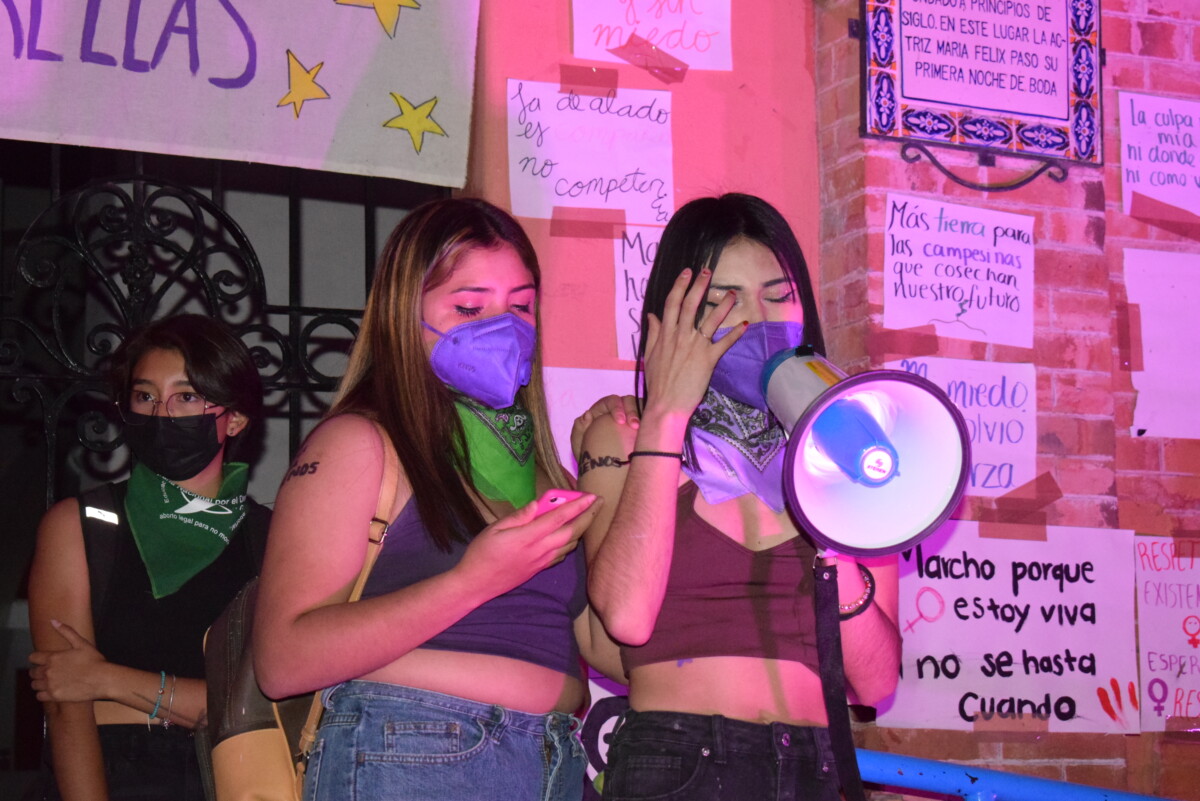
Tears accompanied the confessions; some told their stories for the first time.
Amid tears and shouts of encouragement such as «you are not alone» and «I believe you,» the women who dared to speak out told the tragic stories of the abuses they have suffered. Those who did not speak publicly shared their stories anonymously on the Instagram group @Isonomia.chapala.
The most important issues besides the accusations were the freedom to dress as they please and the insecurity to which women are exposed. «The length of my skirt does not define the respect I deserve,» wrote a protester. Signs read «Quiet mom today I’m not going home alone» and «I can’t die yet.»
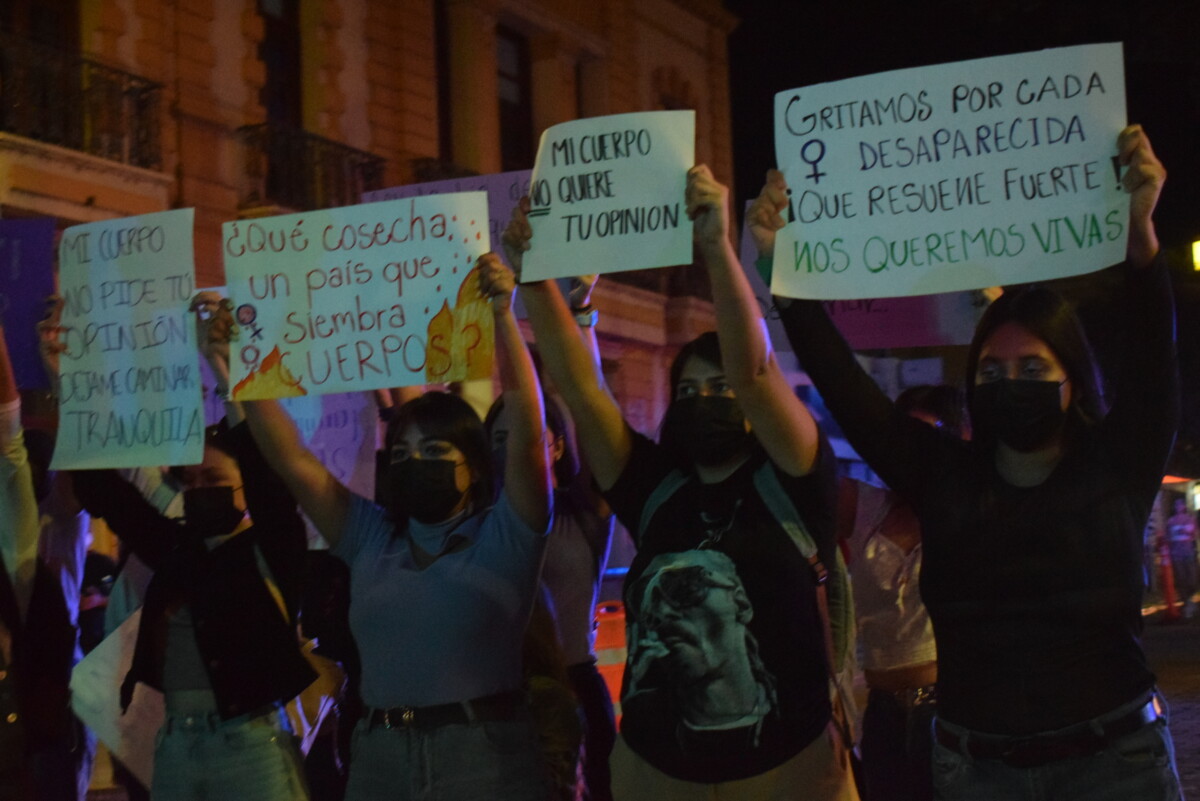
Peace and life were the main demands of the demonstration to the government: «What does a country reap when it sows bodies?”
Women were not alone in demanding their rights. Some were accompanied by men carrying with signs that read: «I like women and I don’t harass them.»
The case of Chuyito was also presented. This young boy suffered rape by his stepfather and physical and psychological violence until the day of his death. All women expressed their solidarity with this situation, demanding that the guilty be found and that the case not go unpunished.
Though the march was peaceful, a patrol of the Municipal Police and three state police were present at all times. Traffic police helped drivers who were not part of the demonstration to find an alternate route.
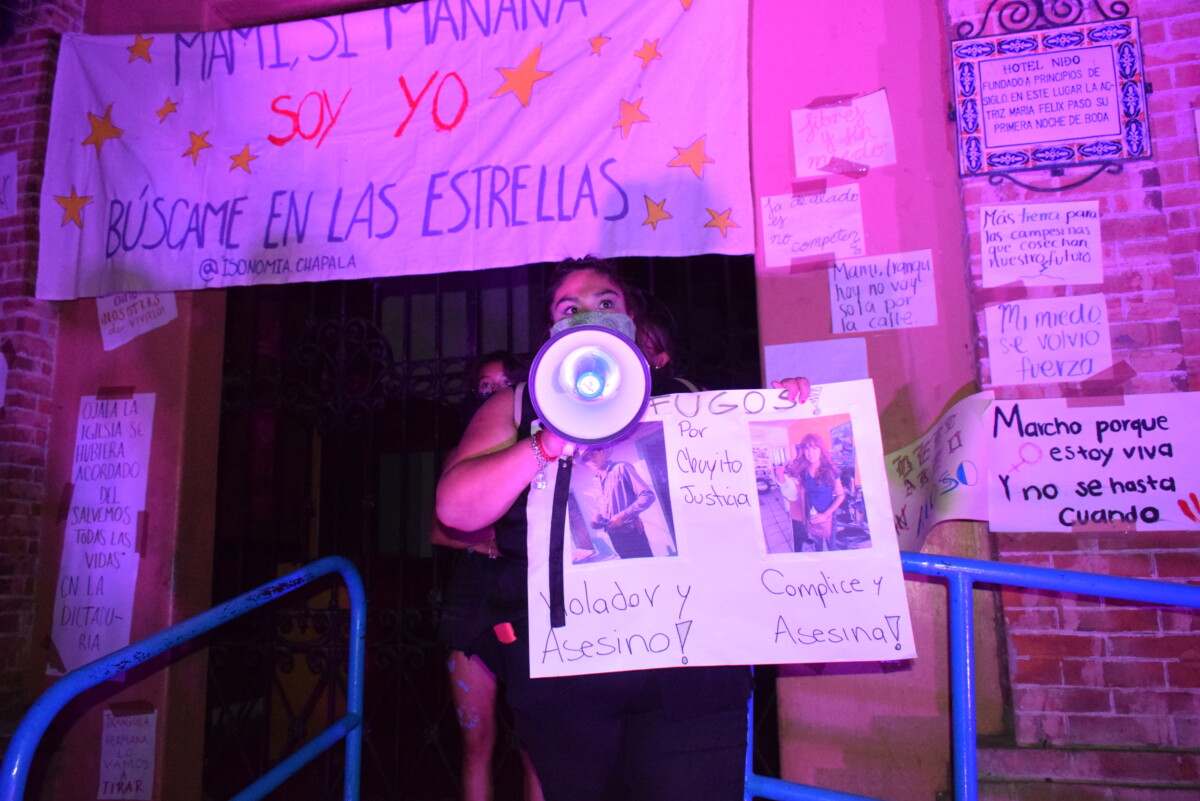
The women expressed their solidarity with Chuyito, a child who died from sexual, physical and psychological abuse. No one has been charged in the crime.
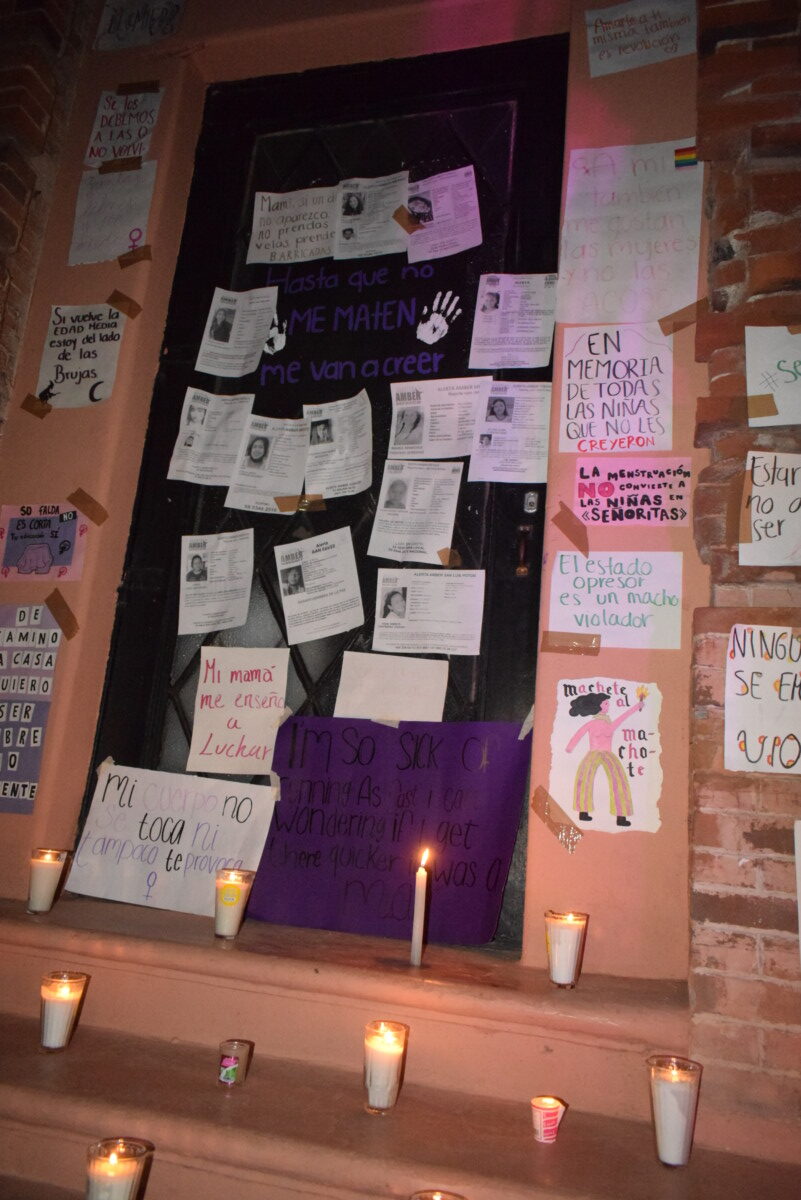
Altar dedicated to the 13 women who disappeared in the municipality of Chapala, titled: «Sorry for the inconvenience, they are killing us.»
Translated by Elisabeth Shields
Fat Tuesday Carnival parade returns to Ajijic with bright colors and a lot of flour
Hundreds of Ajijic residents and visitors celebrated Shrove Tuesday 2022. Photo: Arturo Ortega.
Armando Esquivel (Ajijic).- Hundreds of people attended the Ajijic Shrove Tuesday or “Fat Tuesday” parade and many ended up bathed in flour, including the municipal president of Chapala, Alejandro Aguirre, who accompanied the parade in a Can-Am van.
The Ajijic Delegation float led the parade decorated with Chinese paper, fabrics and colorful balloons, with clowns onboard throwing candy and confetti. Following were three golf carts with members of the Expat community on board, who threw candy to the attendees. However, the Expats did not finish the parade because their electric cart batteries died.

Traditional masked Sayaca dances were performed from start to finish. Photo: Arturo Ortega.
The San Sebastian neighborhood, together with the Martinez family, participated with a cart filled with costumed people throwing flour and candy. Young girls dressed in carnival costumes followed in another cart. The rhythm of two drum brigades and a band added flavor to the atmosphere. The fitness community presented a float with gymnastic Sayacas, traditional masked characters usually dressed as women. Another float had playboy «bunnies» throwing flour into the crowd.
One of the most anticipated floats was the flour “cushion”, renamed the «covicolchón.” Characters wearing wrestling masks would carry the «victims» to the cushion to be covered with flour. A cart with a papier-mâché bull and its rider, a mill with aides and another cart with revolutionary sayacos, carrying air rifles and a cannon that threw flour, completed the colorful – and flour-drenched – parade, which ended with a score of charro riders mounted on horses.

The president of Chapala, Alejandro Aguirre, was not spared from the flour. Photo: Sofía Medeles.
The mayor’s team set up a speaker at the last minute so his vehicle would have some music. He had popsicles to throw to the public. Many approached the mayor to greet him, make requests or even have their picture taken, although there was one who gave a whistle or two at him.
After an hour and 40 minutes, the contingent arrived at the main square, where a cloud of flour greeted the floats and the sayacos. The large crowd cheered what many consider the best carnival of Lakeside.

Sayacos dancing the «caballito» or little horse. Photo: Sofía Medeles.
There were minor incidents such as the separation and distancing of the contingent, the departure of the golf carts in the middle of the parade due to the low batteries, two vehicles that were not removed from the parade route and the report of a senior citizen who fell in front of the horses at the end of the parade, which was not included in the Chapala authorities’ news report.
After the conclusion of the parade the streets of the Pueblo Mágico looked empty, with walls and cobblestones bleached by the flour and and covered with colorful confetti which echoed the joy and desire of the inhabitants and visitors to relive the tradition.

The bull could not be missing in this edition of the parade. Photo: Arturo Ortega.

Detailed mask of a sayaco from Ajijic. Photo: Arturo Ortega.

Even the pets enjoyed the carnival parade. Photo: Arturo Ortega.

The flour cushion was one of the most awaited by the attendees.
Translated by Nita Rudy
Former players of Redes Chapala recognized on their anniversary
The veteran team of Sports Club Redes Chapala with recognition in hand, minutes before the start of their last friendly match against El Chapala. Photo: Jazmín Stengel.
Jazmín Stengel (Chapala).- A team with history. Club Deportivo Redes celebrated its 62nd anniversary in style and with a dedication to Othón Rayo, an outstanding sports promoter in Chapala.
Former and veteran players were recognized by the Government of Chapala.
With the mariachi Águila and three friendly matches, Juan José Rayo Castro, Othón’s son and current manager of the club, praised those present on February 28, as he does every year, with the aim of not letting the tradition die that his grandfather Juan Rayo Suárez started in 1960 and later inherited from his father, Othón Rayo.
Municipal President Alejandro de Jesús Aguirre Curiel also joined in the celebration and presented awards to the most representative players in the club’s 62-year history, such as Mario Sánchez, Rafael Rayo, Nano Sánchez, Luis Ayala, Manuel Huerta, Kiko Camarena, Salvador ‘El Chato’ Chavoya, and goalkeeper Humberto ‘The Spider’ Reyes, among others who were present.
After the presentation of awards, Alejandro Aguirre kicked off the first match, in which the veterans of the ‘El Chapala’ team faced each other. It is worth mentioning that many of the members lived in Los Angeles, California, where they founded a second club under the name of Redes Chapala.
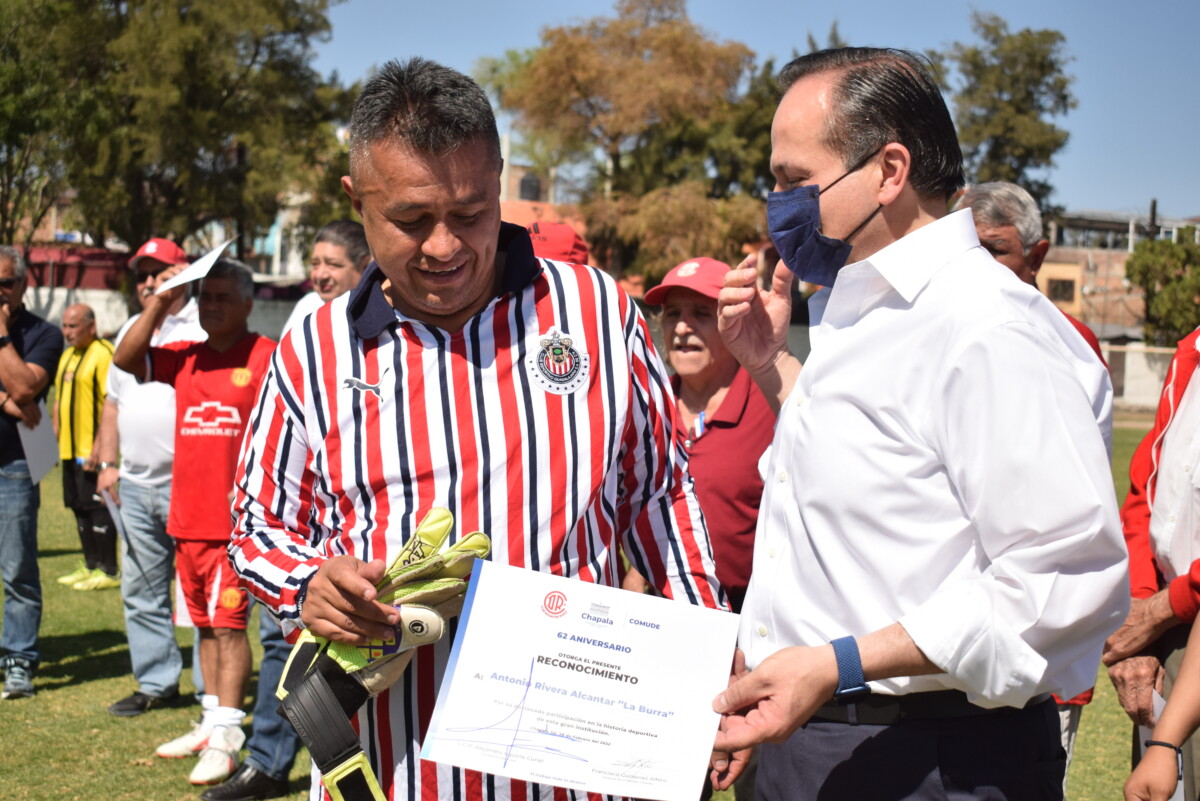
Arturo Rivera Alcantar received his recognition from municipal president Alejandro de Jesús Aguirre Curiel. Photo: Jazmín Stengel.
In the second match, the B division of Club Redes played against the champions of Chapala, Niños Santos. To give way to the stellar match against the Chapala pre-selection for the Jalisco Cup 2022, who demonstrated their level with a 4-0 win. «They are twice our age,» commented Juanito, a Redes director, who explained that in addition to being ten years older than the other players, the club only plays in the local area.
Compared to before, in 1974 they won against Chivas de Guadalajara 2-0, recalls Mario Sanchez, who scored both goals when he was only 17 years old at the time. Or the tour of the United States in 1991, when Reyes Oliveros was the president of the California Soccer League.
Around the 1970s, they counted on the presence of Evelio Ortiza, Brazilian, and Antonio Olivera, Costa Rican, foreign coaches of first and second division who pushed the team to the professional reserves.
«Many said that Redes was for snobs, but I am proof that this is not so. It was for those of us who wanted to grow up,» denied Antonio Mendoza, proud bearer of the number 13 during the first decades of the club’s trajectory.
Over the years and thanks to the initiative of Jesús Cabrera Jiménez, during his 2010-2012 administration, the current third division club Charales de Chapala was founded, supported by the best former players of Club Deportivo Redes as coaching staff.
Translated by Elizabeth Shields
El Chante residents protest new real estate development connecting to existing community water wells
On February 9th, more than 60 residents of El Chante protested against a new real estate development connecting to their water well. Credit: Archive.
Héctor Ruiz Mejía (Jocotepec).– There is still no resolution. Dialogues between the Jocotepec City Hall and the residents of El Chante continue after disagreement over the connection of the community’s water well to a new housing development.
Last Monday, February 28th, the two parties met for the second time. The government was represented by Municipal Trustee, Carlos Alberto Zúñiga Chacón, General Secretary, Rogelio Ramos Pérez, and Felipe Aguilar Montes de Oca, Director of Social Communication.
The residents of El Chante explained that the documentation given to them at the February 14th meeting, in which the legitimacy of the controversial development Ribera Capital Living S.A.P.I de C.V. was assured, was not sufficient for them. As a result, no agreement was reached to restart the work of connecting the water and sewage pipes. Montes de Oca says that a further meeting was agreed upon, but it has not yet been scheduled.
Residents of the riverside community demanded that this time, they be given an official document, on City Hall letterhead, and not the «quick» document that the Public Works Department of Jocotepec gave them in the last meeting.
In addition to the corresponding permits, Felipe Aguilar informed that a water use study will be completed. The study will be done by specialized engineers, and hopefully resolve the questions of the people, as well as give an accounting of the resources used.
A five-member committee will be formed to represent the community of El Chante; they will be in charge of monitoring that all the documentation is in order. They will also ensure that the agreements between both parties are respected, and that they are executed to the letter.
«They want to tell us one thing and give us the runaround, but we are all skilled stonemasons here, we know how to do this,» commented the inhabitants interviewed.
Translated by Amy Esperanto
© 2016. Todos los derechos reservados. Semanario de la Ribera de Chapala


